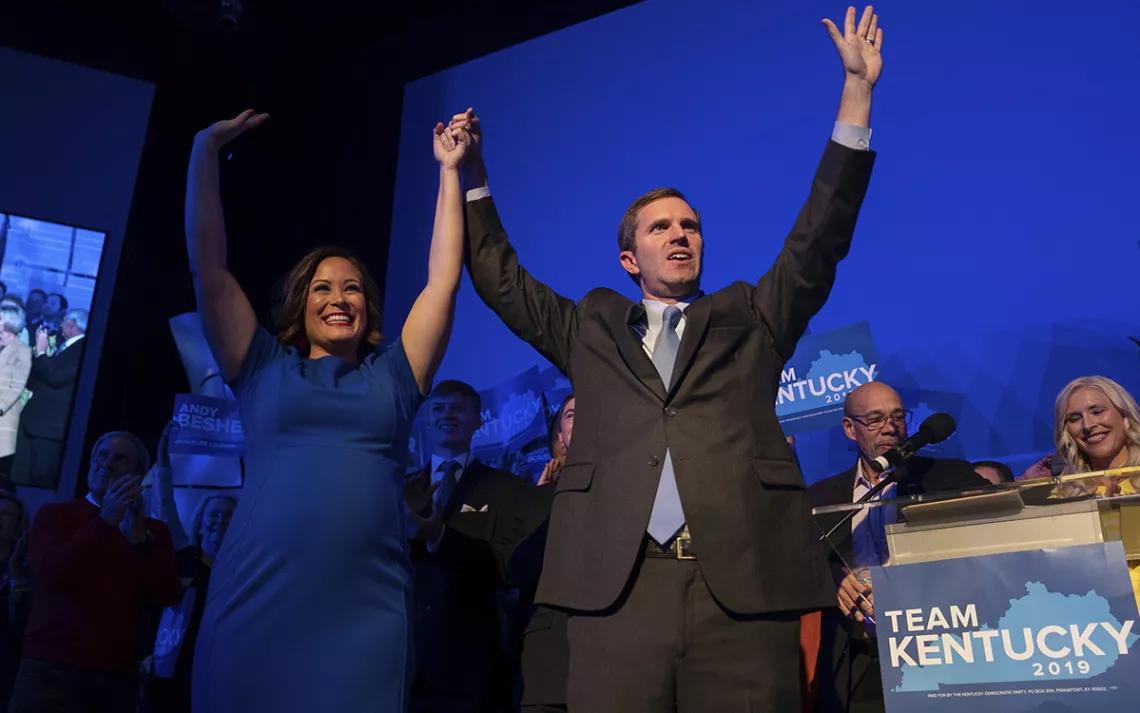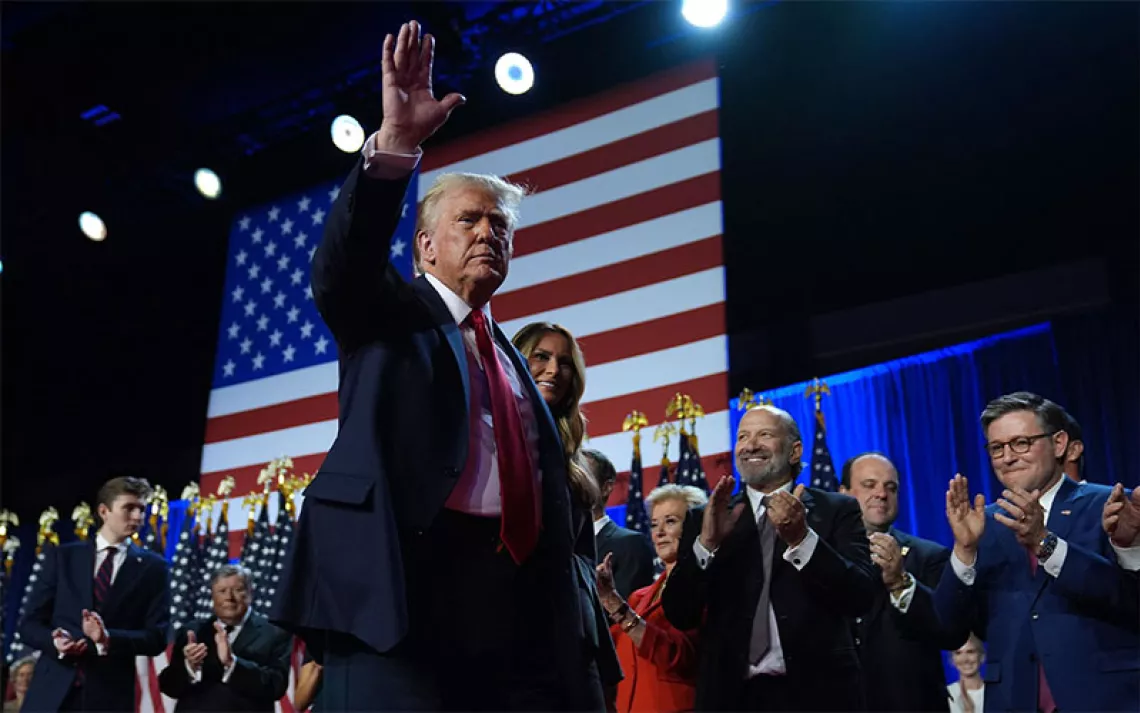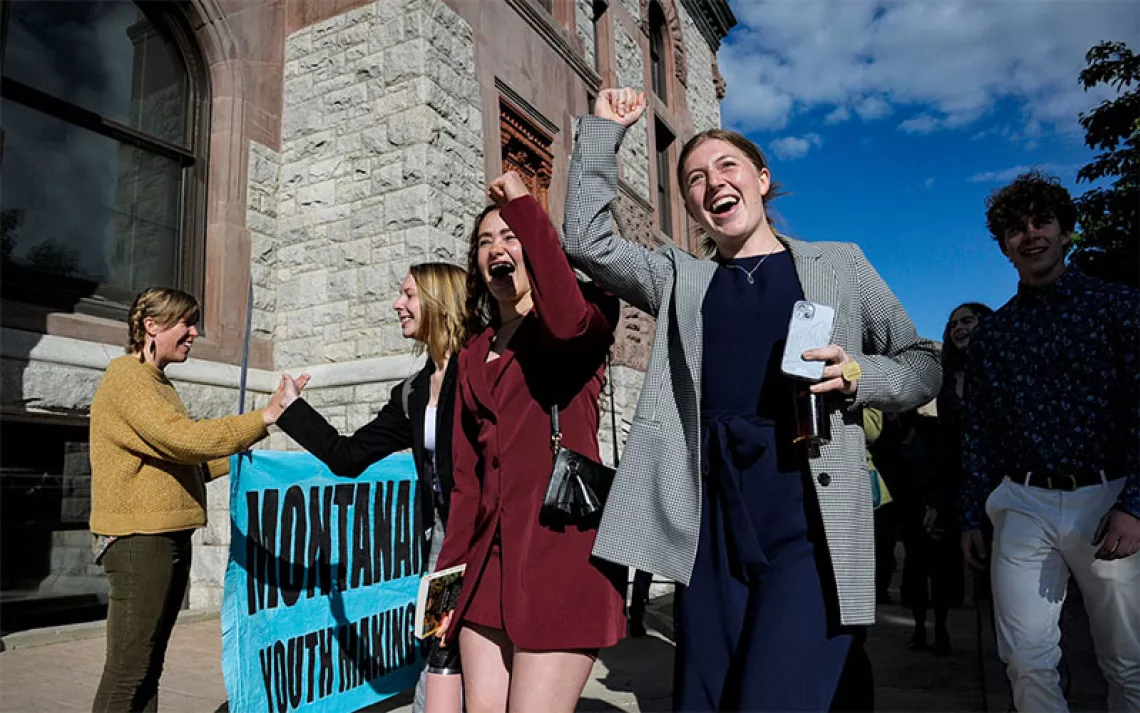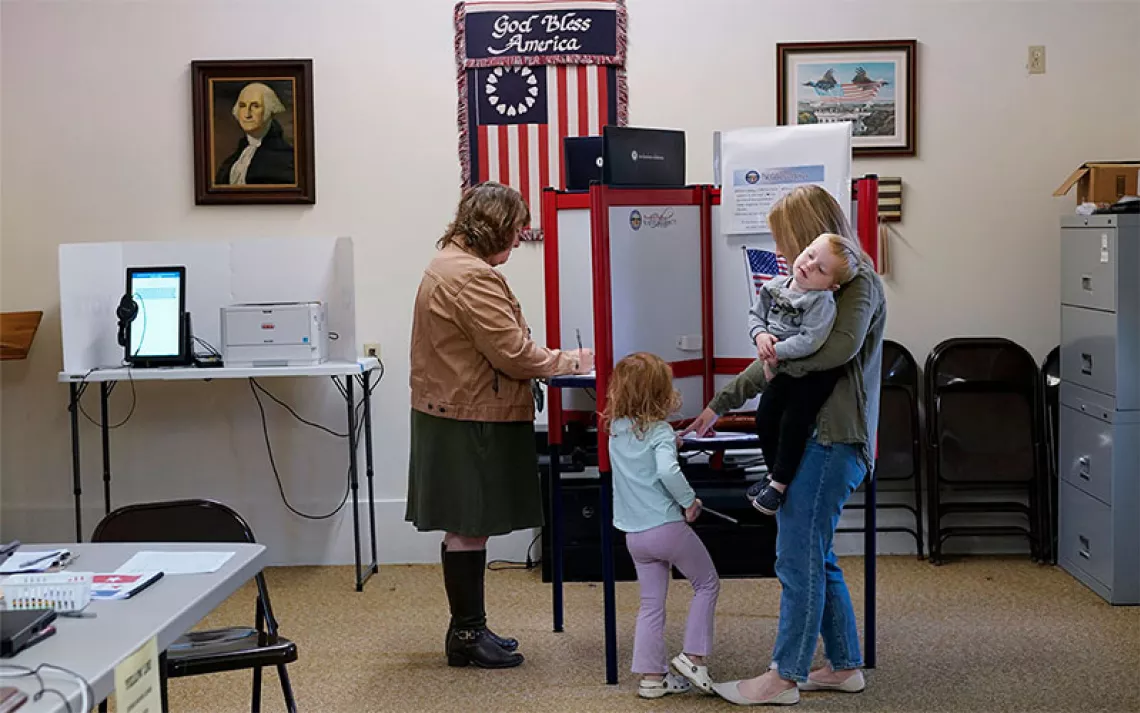5 Key Takeaways From Kentucky’s Election
Rural outreach helped oust America’s most unpopular governor

Democratic gubernatorial candidate and Kentucky attorney general Andy Beshear, with lieutenant governor candidate Jacqueline Coleman on November 5, 2019. | Photo by AP Photo/Bryan Woolston
On the eve of the Kentucky governor’s race in early November, Donald Trump swooped into the state and gave a stump speech in support of Matt Bevin that demonstrated both the uncertainty of how Trump will impact an election and the unpopularity of Bevin. While calling him “a pain in the ass,” Trump urged rally attendees to vote for him anyway. Nevertheless, Bevin lost to former attorney general Andy Beshear, and while hands are wringing over how rural voters will shape the 2020 election, the Kentucky governor’s race demonstrates the complexities of drawing a comprehensive narrative from a single election.
Here are five key takeaways:
1) Voter turnout matters. But it’s complicated.
During the 2015 governor’s race, only 31 percent of Kentucky voters went to the polls, but it sprang up to 42 percent in 2019. Beshear’s campaign chocks it up to grassroots organizing: While Bevin seemed to rely more on rallies than face-to-face conversations, Beshear’s volunteers knocked on 1.1 million doors. But if you look at the total number of voters, it’s a fallacy to say Bevin lost support overall. Higher voter turnout meant more votes for each candidate, and Bevin still took home 200,000 more votes than in his last election, and the five other major offices all went to Republican candidates. This includes Beshear’s former office of the attorney general, which flipped to Senator Mitch McConnell’s protégé, Daniel Cameron.
After losing by a close margin—roughly 5,000 votes—Bevin refuses to concede. Although his campaign has referenced voter fraud and election irregularities, they’ve provided zero evidence that either took place. His campaign has begun recanvassing the vote, a common enough tactic, but a different result is rare. In Bernie Sanders's primary against Hillary Clinton, a recanvassing of Kentucky bought his campaign just 13 more votes.
2) People dislike Matt Bevin. But they also dislike his policies.
Based on his off-the-cuff rhetoric, the list of things Bevin doesn’t care for is long: health care, including reproductive rights; unions; the poor; public education; women; journalists; immigrants; people of color; and LGBTQ Kentuckians. Perhaps his biggest mistake was isolating one of the largest voting blocks in the state—teachers—with his threats to roll back their pensions and cut funds for state universities. He claimed subsequent teacher protests were “ignorant” and infamously said, “I guarantee you somewhere in Kentucky today, a child was sexually assaulted that was left at home because there was nobody there to watch them.” His “right to work” bill also attacked unions, and his rollback of Medicaid and support of a draconian work requirement didn’t help either. Bevin also reinstated a statewide denial of voting rights to residents with former criminal convictions.
3) Kentucky voted for its interests: education and health care.
Beshear focused on local issues. He took up the mantle of education and health care (the largest employers in most eastern Kentucky counties) as well as issues less known nationally, like a water crisis that’s been plaguing eastern Kentucky for years and voting rights. Beshear has promised to restore voting rights to former felons his first week in office, reinstating the rights of over 100,000 people, including a quarter of black people across the state. Name recognition helped: Beshear’s father, former governor Steve Beshear, was the first to reinstate voting rights before Bevin rolled them back, and he also ushered in the biggest overhaul of health care in the state’s history. He advocated for the Affordable Care Act and instituted Medicaid expansion. Before the Affordable Care Act, one in six Kentuckians was uninsured and the state had some of the worst rankings nationwide in almost every major health category. There is still only one clinic where women can receive an abortion in the entire state.
4) Coal is no longer king, but neither candidate paid any attention to climate change.
While much of the national narrative for Kentucky politics pivots around coal, Kentuckians aren’t blind to a failing economy. The protests for back pay from Blackjewel Mine last summer lasted two months and gained national attention, but it’s not just the loss of coal jobs that plague coal communities; it's also the loss in coal severance taxes (money communities make from the extraction of their natural resources). It’s led to cuts in infrastructure like road maintenance and basic services like drinking water. Education, health care, and law enforcement have also suffered—last winter a Martin County sheriff announced over Facebook that he could no longer afford employees. Bevin’s failure to deliver economic development to eastern Kentucky cost him.
Just because pro-coal forces didn’t dominate in this election doesn’t mean that climate change suddenly emerged as a central issue. During September’s climate strike, over 300 students and their adult allies gathered in Louisville, Kentucky. The city’s mayor signed a pledge to declare a climate emergency and state legislator Charles Booker spoke of a statewide Green New Deal. But while Bevin is an outspoken climate denier, Beshear barely mentioned climate change. Although flooding events throughout the state are expected to become more frequent and severe in the coming decades, costing an average of $40 million in annual losses (Bevin declared a statewide emergency last spring due to flooding), Beshear’s campaign failed to link the issue to climate change.
The biggest takeaway isn’t about which candidate was more pro-coal, but that the topic of coal and climate change both became fringe issues during the election. Beshear won eastern Kentucky counties by teaming up with his primary rival, Rocky Adkins, who hails from the region, but for generations, a slew of Democratic governors have continually failed coal country. If Beshear wants to keep the support he won in 2019, he’ll have to do what he promised and give transitioning rural places and the new rural economies a bigger seat at his table.
5) The election wasn’t a referendum on Trump or impeachment. It was about outreach to rural places and rural people.
Unlike The New York Times take on the Kentucky election—their pundit said that the impeachment inquiry consumed the governor’s race and demonstrated how out-of-touch they were by asking, “What is a Shoney’s?”—the election wasn’t a referendum on Trump, and impeachment, just like climate change, wasn’t a major talking point. Considering that McConnell has vast power and name recognition, and Trump still has a 56 percent approval rating in the state, Kentucky's hold on the 2020 election is still quite viable, and one election doesn’t determine the next election’s outcome.
While Trump only lost two Kentucky counties in 2016, Beshear won 23, including 11 in eastern Kentucky, partly due to his campaign’s outreach to rural voters. As Sarah Jones wrote in New York Magazine, rural America is not a monopoly. There are communities of color, family farmers and ranchers, and fiercely independent voters who care more about the issues than the candidate’s party. “For all the prestidigitation that envelops them, rural voters are just people, and people aren’t that difficult to understand,” she writes. In a post-election article, she says governmental neglect and poverty pushed voters to back the democratic party, and “they might do it again, if Democrats give them a reason.”
 The Magazine of The Sierra Club
The Magazine of The Sierra Club



